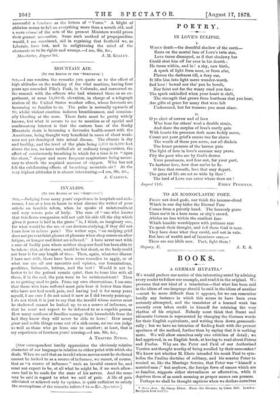INVALIDS.
[TO THE EDITOR OF THE "SPECTATOR,"] Sin,—Judging from many years' experience in hospitals and sick- rooms, I am at a loss to know to what disease the writer of your article on invalids refers, when he speaks of unintermittent and very severe pain of body. The case of "one who knows that this fierce companion will not quit his side till the clay which gives it power is laid in the grave" is, I think, an imaginary one, for what would be the use of our doctors studying, if they did not learn how to relieve pain ? The writer says, "an undying grief does not prevent faint gleams of pleasure when sleep comes on after fatigue, or hunger and thirst are relieved." I have never met with a case of bodily pain where neither sleep nor food has been able to be taken ; that, at the worst, would be but short, as the body could not bear it for any length of time. Then, again, whatever disease I have met with, there have been some remedies to apply, or of what use are all our narcotics and opiates, our fomentations, poultices, liniments, lotions, and the rest ? Would it not be better to let the patient remain quiet, than to tease him with all these, if in the end, the pain were to be unintermittent? Then as to getting used to pain. From my own observations, I am sure that those who have suffered most pain bear it better than those who have not had much pain, and having had it for many years myself, I am sure I do not mind it now as I did twenty years ago. I do not think it is just to say that the invalid whose nerves must be sheltered cannot be looked up to as a source of influence, or that he must not expect to be deferred to as a capable person. How many mothers of families manage their households from the bed they know they will never be able to leave ! How many great and noble things come out of a sick-room, no one can judge so well as those who go from one to another ; at least, that is my experience of fourteen years' nursing.—I am, Sir, &c.,
A TRAINED NURSE.
[Our correspondent hardly appreciates the obviously relative character of our language in relation to either point with which she deals. When we said that an invalid whose nerves must be sheltered cannot be looked to as a source of influence, we meant, of course, that as "a source of influence" such an invalid cannot be, and must not expect to be, at all what he might be, if no such allow- ance had to be made for the state of his nerves. And the same may be said in regard to what we said of pain. A life of pain alleviated or relieved only by opiates, is quite sufficient to satisfy the assumptions of the remarks referred to.—E1). Spectator.]






























 Previous page
Previous page